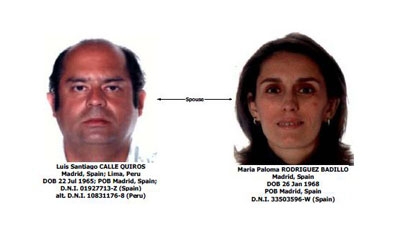*This article was updated August 30, 2021, from its original version to reflect the status of legal cases against Luis Santiago Calle Quiros.
The United States has added two alleged money launderers from Spain and Peru with links to Colombia to its “Kingpin List,” highlighting the transnational nature of a crime increasingly carried out by specialized and independent networks.
According to a press release from the US Treasury, Spanish-Peruvian dual national Luis Santiago Calle Quiros and his Spanish wife Maria Paloma Rodriguez Badillo, and the five companies they oversee are part of a money laundering cell which moves drug money from Europe to Colombia. However, after an investigation, Calle Quiros was exonerated of all charges in 2018.*
SEE ALSO: Coverage of Money Laundering
The cell is linked to Isaac Perez Guberek Ravinovicz, who was placed on the list in July alongside his son and seven other individuals based in Colombia and Israel for laundering hundreds of millions of dollars linked to various organized crime groups.
According to Director of the Treasury’s Office of Foreign Assets Control Adam Szubin, Calle and Rodriguez made up “a major node in the Guberek money laundering network.” Of the five companies, two were based in Madrid and three in Lima.
The Treasury reported that the pair collected cash profits from drug trafficking at their offices in Madrid and funneled the money through accounts controlled by Guberek, who is based in Bogota, Colombia.
Under US law, all US assets of the pair and their companies will now be frozen and US nationals forbidden from doing business with them.

InSight Crime Analysis
The blacklisting of Calle and Rodriguez highlights the intricacies of the equally important but much less reported financial side of international drug trafficking.
Money laundering is a truly transnational crime, as shown by this ring, which has tentacles in Colombia, Israel, China and the Middle East, as well as the drug source and destination — Colombia and Europe.
The ring operates as specialists for hire, laundering money for various organized crime networks and operating above the rivalries which often exist among drug trafficking organizations.
This type of specialist network is likely to become increasingly common as large cartels fragment, with cooperating criminal groups narrowly focused on one aspect of the drug trade replacing monolithic organizations that try control the whole chain.
The case also highlights the continued significance of Spain within the growing European drug trade. European police association Europol identified Spain as a key site for cocaine consumption, importation and processing in a report released in January.

